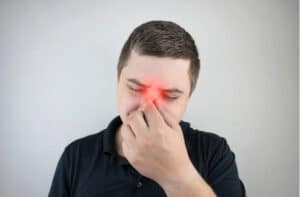
How Sinus Pressure Builds
When irritation affects the nasal passages, the sinuses may increase their production of mucus. The nose is limited, though, in its capacity to hold the excess, so swelling develops in the nasal passageway. The resulting pressure can feel like tightness in the sinuses or like full-face tightness and pain. The pressure can also progress into a headache.
Why the Sinuses May Overproduce Mucus
It can be somewhat difficult to pinpoint what stimulates the production of too much mucus in the sinuses. There are several contributing factors. Often, though, it is an irritant in the environment to which you have been exposed for too long. What constitutes prolonged exposure is different for everyone. Also, what may not irritate one person may be incredibly offending to others.
What You Can Do to Alleviate Sinus Pressure
In order to relieve the tightness of sinus pressure, you may first need to locate it. There are four sinus cavities, and you want to treat the correct one. These include:
- The frontal sinuses, located in the forehead.
- The ethmoid sinuses, located between the eyes and across the nose.
- The maxillary sinuses in the cheeks.
- The sphenoid sinuses behind the eyes, which can experience pain up the front of the head and down the back.
Once the location of the affected sinus cavity has been identified, you might reduce pain and pressure with one or more of the following:
- Massage. A gentle sinus massage may reduce swelling and help the excess mucus buildup drain.
- Cooling. A cold compress or ice pack can soothe pain from sinus pressure just as it can a strained muscle.
- Moisten the air. Studies show that sinus pressure decreases when a humidifier is used. Humidifiers add moisture to the air, so can work quickly to soothe irritated nasal passages.
- Elevate the head. Sinus pressure may make you want to lie down. However, mucus may build up more in a flat position. Keeping the head elevated may help the sinuses and nose drain.
- Drink water. Staying adequately hydrated is a must for those sinus headaches. It may also help thin the excess mucus so it drains more easily.
- Do a sinus rinse. A sinus rinse with saline and lukewarm water can be immediately soothing to inflamed sinuses and nasal passages. This should only be done using distilled water.
Sinus pain and pressure that occur frequently may indicate a condition like chronic sinusitis. At St. Louis Sinus Center, our patients learn what is behind their symptoms and how, with our help, they may manage them or eliminate them altogether. To schedule a consultation at our St. Louis or Festus office, contact us at 314-450-7720.

